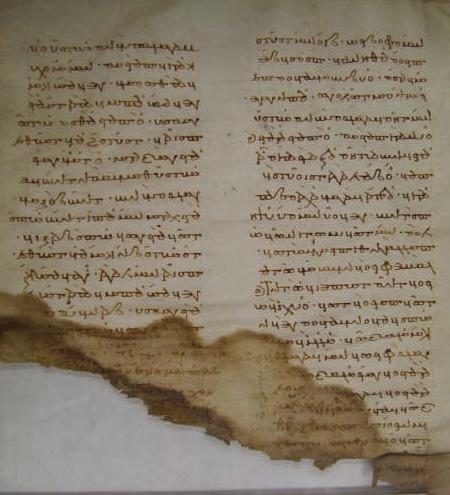On a rare day off from his seminary internship at St. John’s Evangelical Lutheran Church in Perrysville, Pennsylvania, Winfred Belcher, M.Div ’85, decided to explore the area and ended up discovering a document that would greatly impact his life and eventually contribute to ongoing scholarly research.
“I was looking for antiques and came across a general store-type place in Warrendale, Pennsylvania. As I ventured farther into the store, I found a piece of parchment that was in between glass and felt like it was something special,” said Belcher. “I wasn’t making a fortune as a vicar intern, but I felt that the parchment was important. I purchased it for $1,000 or, at the time, two months’ wages.”
After earning his undergraduate degrees in psychology and Judaic studies from Emory University, Belcher traveled to the Middle East to work at an archeological dig before relocating to Columbus, Ohio, to earn his Master of Divinity degree at Trinity Lutheran Seminary. While in Israel, he learned how to speak modern Hebrew. Belcher can read biblical Hebrew, Greek from four historical periods, and Aramaic.
Even with his extensive knowledge of different languages, Belcher was initially unable to decipher the newfound piece of history.
“There were no spaces and I didn’t recognize the language,” said Belcher. “I really just wanted to find out what it was.”
During his time at Trinity Lutheran Seminary, Belcher worked with his thesis adviser, the Rev. Walter Taylor Jr., Ph.D. Their close mentor/mentee relationship continues to this day.
“Win was eventually able not only to do his own, more accurate, transcription, but to identify the author and larger document of which the fragment was a portion. In his thesis, he collated the Warrendale fragment with other manuscripts and added substantially to the world’s knowledge of the Psalms material from St. John Chrysostom. His work is a classic example of the kind of original research expected of a Ph.D. dissertation, let alone an M.Div. thesis,” said Taylor. “Overall, it was exciting to see how he moved from the chance finding of a Greek fragment to a sophisticated piece of research.”
Through his own investigative research, Belcher determined that the document was a manuscript fragment from the 10th century of a sermon on Psalm 144 from Chrysostom (347-407 A.D.). It originally was part of a commentary on a larger number of psalms.
“Chrysostom was a preacher in Antioch (Syria) who later became bishop of Constantinople. His preaching, in Greek, was so eloquent that he acquired the nickname ‘golden mouth’ (Chrysostom) after his death. Large crowds would come to church to listen to him,” said Rev. Joy Schroeder, Ph.D., professor of Church History at Trinity and Capital. “Chrysostom’s sermons were so riveting that he warned people standing in the congregation to beware of pickpockets who tried to steal from them while their attention was fastened upon the preacher. More than 900 of his sermons survive. They were copied for centuries after his death so preachers could study his sermons and read them aloud to audiences.”
The Warrendale fragment has been on loan to Hamma Library since 1985. Capital students, faculty, and staff had the opportunity to view the historical document at a special exhibition on March 21.
After calling Columbus home for close to 40 years, the Warrendale fragment will be moved to the University of Michigan to be digitized at the Harlan Hatcher Graduate Library. On March 24, Belcher will drive north to hand deliver the historical document to Pablo Alvarez, Ph.D., curator of Special Collections Research.
“The University of Michigan Library already holds an important collection of Byzantine manuscripts, more than 100 codices and fragments, including manuscripts containing works by John Chrysostom,” said Alvarez. “This fragment is a great match to our collection and will be used for teaching and research. There are only a few examples of manuscripts preserving these particular texts by Chrysostom in American libraries.”
Through Belcher’s generosity, researchers will have the opportunity to study the Warrendale fragment for years to come.
“It belongs someplace where it can be made available for a broader audience of scholars,” said Belcher. “I thought it would be prudent to give it a more permanent home among other Greek manuscripts of Chrysostom for scholars in Patristics and Greek Paleography.”
Through digitization, the Warrendale fragment can now be reconnected with a larger manuscript at the University of Portland. The University of Portland’s manuscript had been unidentified until Belcher revisited his work a few years ago.
“For 1,100 years, this manuscript has had different temporary guardians,” said Belcher. “I am just another temporary caretaker for this folio. Many names have come before me that we’ll never know. I’m just the last one before it finally finds a permanent place to rest and be taken care of.”
For more information about Trinity Lutheran Seminary at Capital University, visit http://elayfa.lmjrsygc.com/trinity.
For more information about the Hamma Library at Trinity Lutheran Seminary at Capital University, visit http://libguides.lmjrsygc.com/Hamma.
To learn more about St. John Chrysostom, visit http://www.livinglutheran.org/2018/10/john-chrysostom/.
